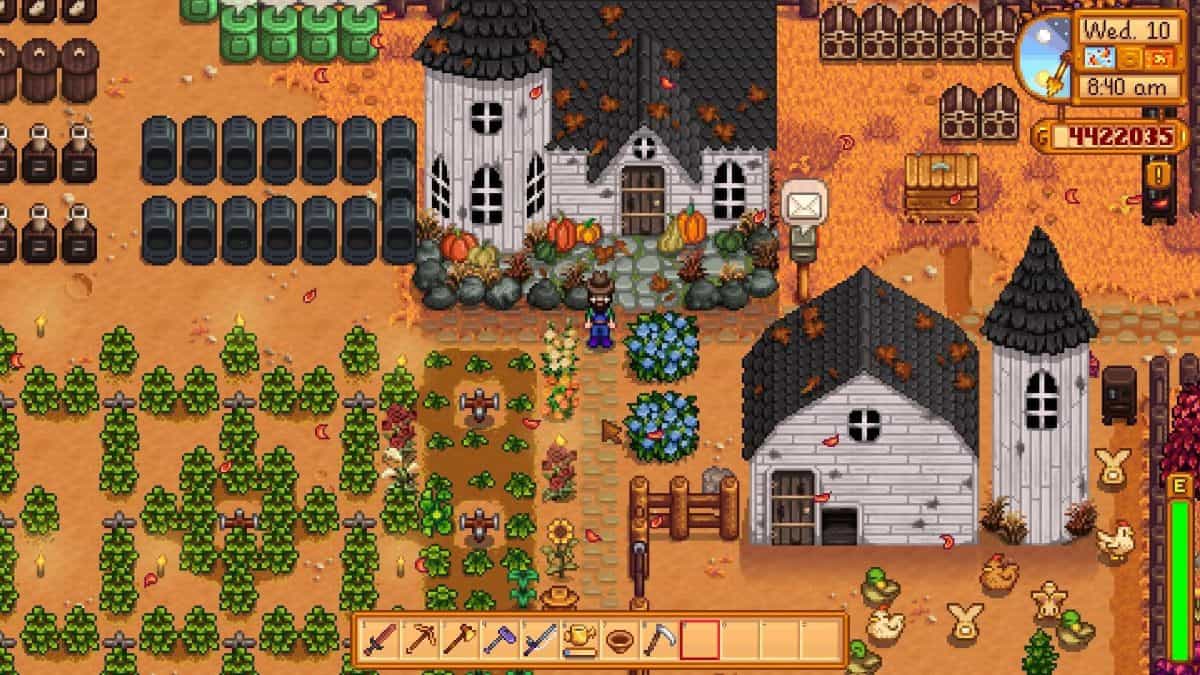Stardew Valley Slots

- Stardew Valley Slot Machine Pattern
- Stardew Valley Slot Machine Odds
- Stardew Valley Slot Machine
- Stardew Valley Slot Machine 1.4
Stardew Valley General Discussions Topic Details. May 9, 2018 @ 4:14pm Removing filled slots in multiplayer I need to know how to do this as all 4 of. The slot machines have certain patterns that can be exploited. By betting 100 when expecting a win and 10 when expecting a loss, you can quickly obtain enough coins to buy an item from the shop. It's also Important to note the best win (highest payout modifier) is usualy first in the win streak, exceptions are low payout wins: Double cherries. Stardew Valley multiplayer: How to start a multiplayer farm. The quickest and easiest way to start a multiplayer farm is from scratch: Select 'Co-Op' in the main menu.
Along with raising crops, Stardew Valley has a fully-featured animal farming (or ranching) system. It features chickens, ducks, rabbits, cows, goats, sheep, and pigs (with a few extra special animals). This guide will walk you through how to get started and give you a few strategies for getting the most out of your animals.
General Information
With the exception of trellis/vine farming in your greenhouse, animal farming is one of the most passive money makers in the game. The upfront costs are pretty high, but once you've upgraded your buildings and built a few silos (since your deluxe buildings automatically feed your animals), you basically just pick up your animal products and move on.
The advantage to raising animals is that they provide goods all year round (except for pigs, they don't find truffle in the winter). This gives you something to do besides mine in the winter, which is especially important in your first year if you don't have your greenhouse from the community center yet.
Basic Requirements
Requirements for animal farming:
- Silo
- Scythe
Regardless of your late game plan, the first thing you should do to prepare for any sort of animal farming is to build at least one silo as early as possible. The silo allows you to use your scythe on grass patches to gather hay.

Note: You should try not to clear any grass patches without a silo.
Each of your animal buildings should have one (1) heater and one (1) machine for each artisan good per animal. Mayonnaise machines use eggs (chickens and ducks), looms use wool (sheep and rabbits), cheese presses use milk (cows and goats), and oil makers use truffles (pigs).
Dumb Silo Math: Three (3) silos for every two (2) fully upgraded farming buildings. The actual formula is the follwing: (number of animals * 28) / 240 = number of silos
Tools
The following tools are used for animal farming:
| Tool | Cost | Use |
|---|---|---|
| Scythe | - | Used to gather hay from grass; if you've removed all of the grass from your farm during a season, purchase a Grass Starter from Pierre's General Store |
| Milk Pail | 1,000g | Used to get milk from cows and goats. |
| Sheers | 1,000g | Used to get wool from sheep. |
The milk pail and sheers can be purchased from Marnie, each cost 1,000g.
Related Professions
The following professions have an impact on raising animals:
| Skill | Level | Profession | Benefit |
|---|---|---|---|
| Farming | 5 | Rancher | Animal products sell for 10% more. |
| Farming | 10 | Coop Master | Befriend coop animals faster; incubation time cut in half. |
| Farming | 10 | Shepard | Befriend barn animals faster; sheeps produce wool faster. |
| Farming | 10* | Artisan | Artisan goods sell for 50% more (only if you chose Tiller as your level 5 farming profession). |
| Foraging | 5 | Gatherer | Chance for double harvest when foraging items (this works for truffles) |
Honestly, the best farming profession path for ranching is Tiller > Artisan since Artisan is probably the best profession in the game and it applies to more than just ranching.
Rancher is a strange profession since by the time you can choose this profession, you'll be able to process the eggs in the mayonnaise machine (I guess it's okay for selling milk before ). Both Shepard and Coop Master allow you to raise your animals up to 5 hearts faster so you can sell them earlier or more often.
Rancher > Coop Master is the best profession path for true animal farming professions. It also gets better for each big coop you have on your farm because you can incubate multiple animals (preferably ducks) at a time.
Shepard doesn't offer added benefits to sheep, pig, cow, or goat farming so it forces you into raising sheep. You could make the case that this is the simplest or maybe the truest animal professions (read: more fun, not necessarily economically efficient). It prevents downtime on your sheep and makes your sheers more useful.
Regardless of which farming professions you choose, Gatherer is the best foraging profession. Similar to Aristan, it provides value for more than one thing in Stardew Valley so it's a little better than other options.Stategies
The basic strategy for animal farming is pretty simple. Build a silo for hay, build the appropriate building for the animal you want to raise, purchase the animal and tools from Marnie, and then feed and interact with the animal every day. Eventually the animal will produce goods, whether it's passively for coop animals or with tools for barn animals. Process those goods in equipment for further profit.
This works for all animals
Artisan Strategy
This is the simplest end game strategy. For your farming professions, you'll take Tiller and Artisan. Just follow the recommendation of having a machine for every animal product and profit.
For example, if you have twelve (12) chickens, you want to make twelve (12) mayonnaise machines for you coop. At beginning of each day, pick up all of the eggs and put them in the mayonnaise machine (and retrieve the previous day's mayonnaise from the machine).
For this strategy, rabbits work best in the coop and sheep work the best for the barn.
Note: Pigs also work very well using this strategy, but will not produce truffle in the winter. Truffle gathering is impacted by your gathering skill/professions, so gatherer/botanist is the best option for gathering professions.
Duck Farming Strategy
Once you've unlocked ducks, purchasing one duck and incubating the egg becomes a viable strategy (repeat this until your coop is full). Once you have a full coop, find a duck that has a maxed out friendship rating (5 stars), sell the duck, and incubate a new duck egg.
This strategy is best used with the Coop Master profession, since the incubation period means loss of goods (one less duck means one less egg every day) and being able to raise a duck's heart level faster means you can sell faster.
You can choose not to sell your ducks when they reach maximum hearts, you'll just miss out on potential profit. Incubating and raising ducks is what makes Coop Master worthwhile, while straight processing mayonnaise is better for Artisans.
Note: Since pregnancy is fairly infrequent, raising barn animals with the intent to sell them isn't a great idea. As in, taking the this strategy and trying to apply it to Shepard; don't do it.
Buildings
There are three major buildings that can be built (and upgraded) by Robin at the Carpenter's Shop: (1) silo, (2) coop, (3) barn. Silos store hay for your animals, the coop allows you to raise chickens (and eventually ducks and rabbits), and the barn allows you to raise cows (and eventually goats, sheep, and pigs).
Remember to place a heater in all of your coops and barns before winter. You can purchase heaters from Marnie for 2,000g.
Silo
The first thing you should do if you plan on raising any animals is to get a silo. Once you've built a silo, you have a chance of getting hay from cutting down grass (you should wait to clear your farm from grass until you have a silo). Each silo stores up to 320 hay.
The silo is a 3x3 square that requires the following material:
- 100g
- 100 stone
- 10 clay
- 5 copper bar
Coop
The coop allows you to raise chickens. The coop's dimensions are 3x6 with the door in the 2nd slot and the gate in the 3rd slot. Upgrading to a big coop unlocks ducks and the deluxe coop unlocks rabbits, all which can be purchased from Marnie.
The big coop comes with an incubator that allows you to hatch new animals from eggs and the deluxe coop automatically feeds your animals (assuming that you have enough hay in your silo).
| Coop | Big Coop | Deluxe Coop | |
|---|---|---|---|
| Cost | 4,000g 300 wood 100 stone | 10,000g (14,000g total) 400 wood (700 wood total) 150 stone (2500 stone total) | 20,000g (34,000g total) 500 wood (1,200 wood total) 200 stone (450 stone total) |
| Animals | Chickens | Ducks | Rabbits |
| Space | 4 slots | 8 slots | 12 slots |
| Features | None | Incubator | Auto-feed system |
Coop Animals
Ducks are unlocked once you've upgraded a coop to a big coop and rabbits are unlocked once you have upgraded to a deluxe coop.

| Chicken | Duck | Rabbit | Dinosaur | |
|---|---|---|---|---|
| Requires | Coop | Big Coop | Deluxe Coop | Big Coop |
| Cost | 800g | 4,000g | 8,000g | X |
| Max Value | 1,040g | 5,200g | 10,400g | 1,278g |
| Produces | Egg (40g) Large Egg (75g) | Duck Egg (50g) Duck Feather (100g) | Wool (270g) Lucky Rabbit's Foot (450g) | Dinosaur Egg (350g) |
Note: Void Chickens have been left off this list. They simply different enough from a chicken to be noted. A void egg is worth 50g instead of 40g and cannot make large eggs; the void egg cannot be made into mayonnaise.
Dinosaurs can be unlocked by placing a dinosaur egg in your coop's incubator. Dinosaur Eggs can be found while digging in the mountain area or by collecting treasure while fishing.
Barn
The basic barn allows you to raise cows. Upgrading to a big barn unlocks goats and the deluxe barn unlocks sheep and pigs, all of which can be purchased from Marnie.
The barn's dimensions are 4x7 with the door in the second slot and the gate in the 4th slot. This allows you to build stack barns vertically with a fence (or gate) in the 3rd spot with a field extending to the right of the barns.
| Basic | Big | Deluxe | |
|---|---|---|---|
| Cost | 6,000g 350 wood 150 stone | 12,000g (18,000g total) 450 wood (800 wood total) 200 stone (350 stone total) | 25,00g (43,000g total) 550 wood (1,350 wood toatl) 300 stone (600 stone total) |
| Animals | Cows, goats | Goats | Sheep, pigs |
| Space | 4 slots | 8 slots | 12 slots |
| Features | None | Allows pregnancy | Auto-feed system |
You can open the barn door by clicking on the large door from the outside. This allows your animals to wander around outside if the weather is fair and eat if there's grass outside (for pigs, collect truffles too). Animals go back inside to sleep and it's recommended to close the door every night.
Barn Animals
Goats are available from Marnie once you've upgraded to a big barn; sheep and pigs are available once you've upgraded to a deluxe barn.
| Cow | Goat | Sheep | Pig | |
|---|---|---|---|---|
| Requires | Barn | Big Barn | Deluxe Barn | Deluxe Barn |
| Cost | 1,500g | 4,000g | 8,000g | 16,000g |
| Max Value | 1,950g | 5,200g | 10,400g | 20,528g |
| Produces | Milk (100g) Large Milk (150g) | Goat Milk (180g) Large Goat Milk (275g) | Wool (270g) | Truffle (500g/625g/750g) |
Pigs must be outside during the day in order to gather find truffle and truffle will not be found outside in the winter.
Equipment
All of the relevant animal-based equipment comes from farming skills, starting at level two with the mayonnaise machine and ending with the oil maker at level 8. Processing animal products basically 4x's your return on investment; for example, an egg worth 40g is worth 150g as mayonnaise.
With all equipment, it is strongly recommended to have one machine per animal in the appropriate building (mayonnaise machines in the coop, cheese presses in the barn); this allows you to load the equipment and pick up the goods the next day, it's a much better use of time than loading the equipment every 3-6 hours.
Mayonnaise Machine
Mayonnaise machines can be built once you've obtained level 2 farming and requires the following materials:
- 15 wood
- 15 stone
- 1 earth crystal
- 1 copper bar
Tip: Use a crystalarium for a steady stream of earth crystal.

| Product | Ingredient | Time | Value |
|---|---|---|---|
| Mayonnaise | Egg/Large Egg | 3 hours | 150g/225g |
| Duck Mayonnaise | Duck Egg | 3 hours | 300g |
Cheese Press
A cheese press can be built once you've obtained level 6 farming and requires the following materials:
- 45 wood
- 45 stone
- 10 hardwood
- 1 copper bar
Hardwood can be a bit of an issue if you didn't stocked up on it; make sure you add the Secret Forest to your daily-ish route for 8 hardwood per day.
| Product | Ingredient | Time | Value |
|---|---|---|---|
| Cheese | Milk or Large Milk | 3.2 hours | 160g/240g |
| Goat Cheese | Goat Milk or Large Goat Milk | 3.2 hours | 300g/450g |
Loom
Looms can be built once you've obtained level 7 farming and requires the following materials:
- 60 wood
- 30 fiber
- 1 pine tar
| Product | Ingredient | Time | Value |
|---|---|---|---|
| Cloth | Wool | 4 hours | 375g |
Remember that wool is obtained from both rabbits (passively) and sheep (with sheers).
Oil Maker
An oil maker can be built once you've obtained level 8 farming and requires the following materials:
- 50 slime
- 20 hardwood
- 1 gold bar
| Product | Ingredient | Time | Base Value |
|---|---|---|---|
| Truffle Oil | Truffle | 5-6 hours | 850g |
| Oil | Corn | 2 days | 100g |
| Oil | Sunflower | 2 days | 100g |
| Oil | Sunflower Seeds | 2 days | 100g |
Don't try to make a profit by putting corn, sunflowers, or seeds in the oil maker. You get a 2x return on your corn but at the cost of two days, but a preserves jar is much more efficient.
Stardew Valley Slot Machine Pattern

Stardew Valley Slot Machine Odds
Closing Thoughts
Stardew Valley Slot Machine
While animal farming isn't necessarily the most econimically viable thing to do in Stardew Valley, remember that you are playing a game and games are meant to be fun. Crop farming is tedious, boring, and time consuming (energy consuming too); raising animals gives you something else to do and it's less of a grind than farming crops or fishing. It's just like how combat supplements mining; just think of how brutally boring the mines would be without monsters.